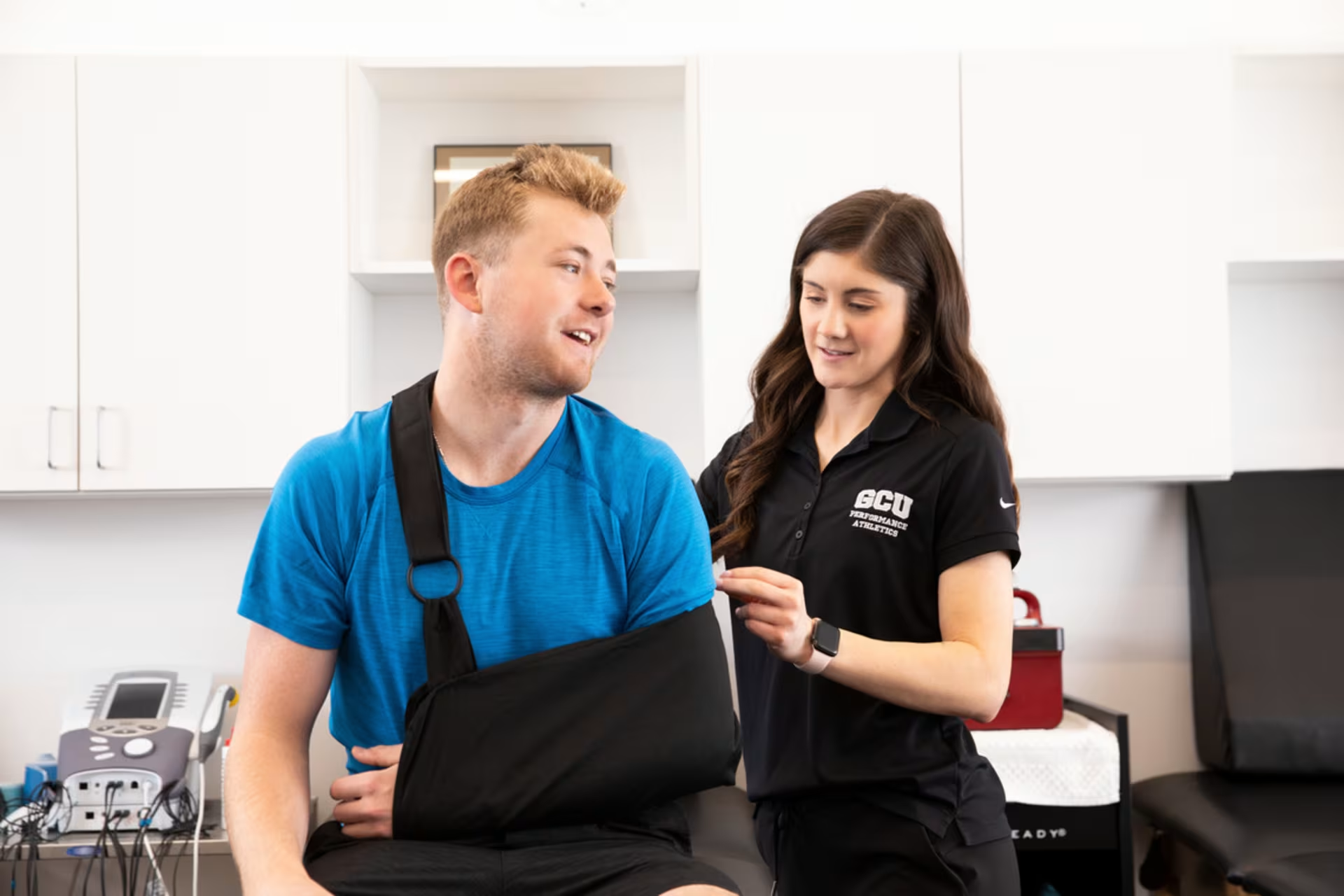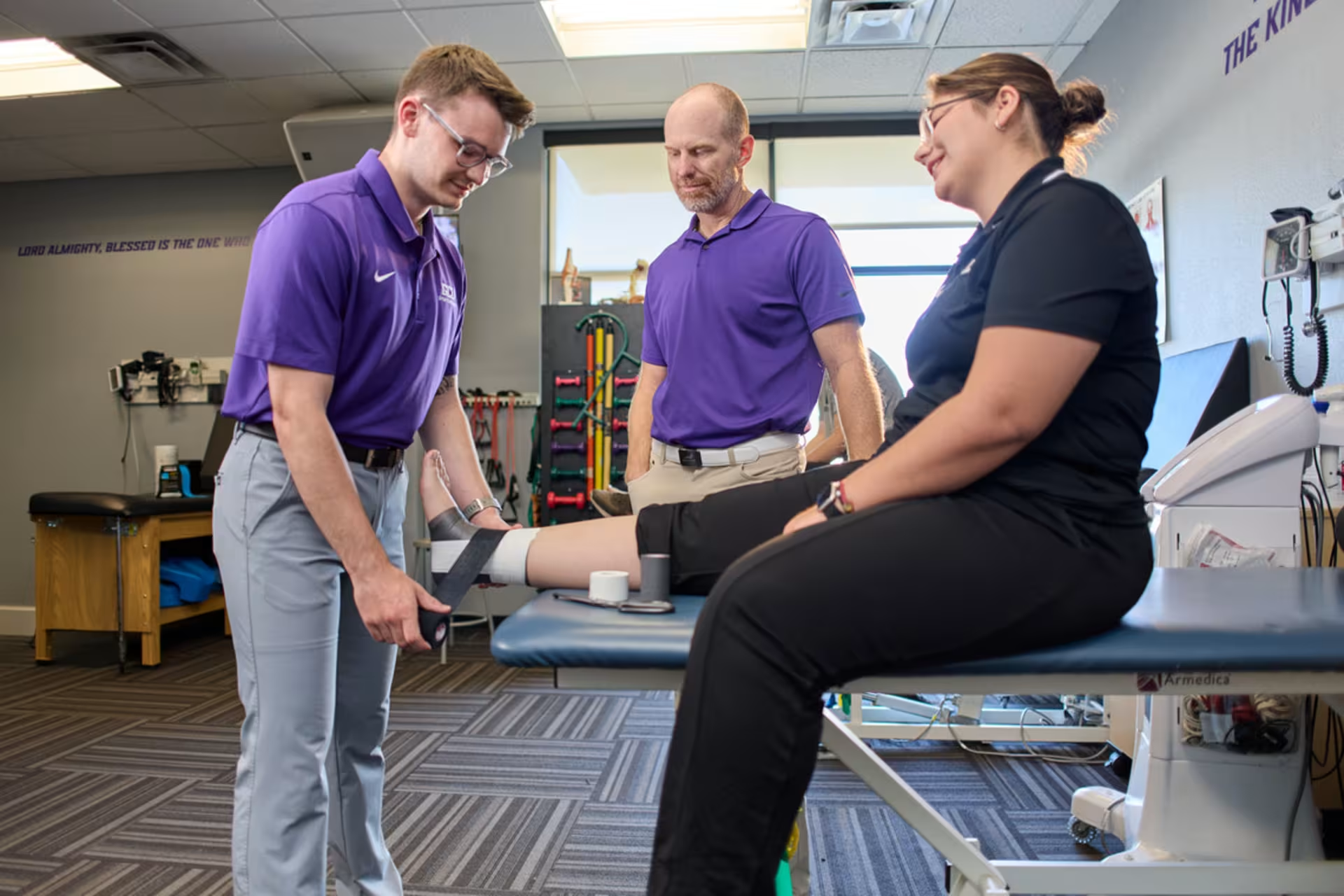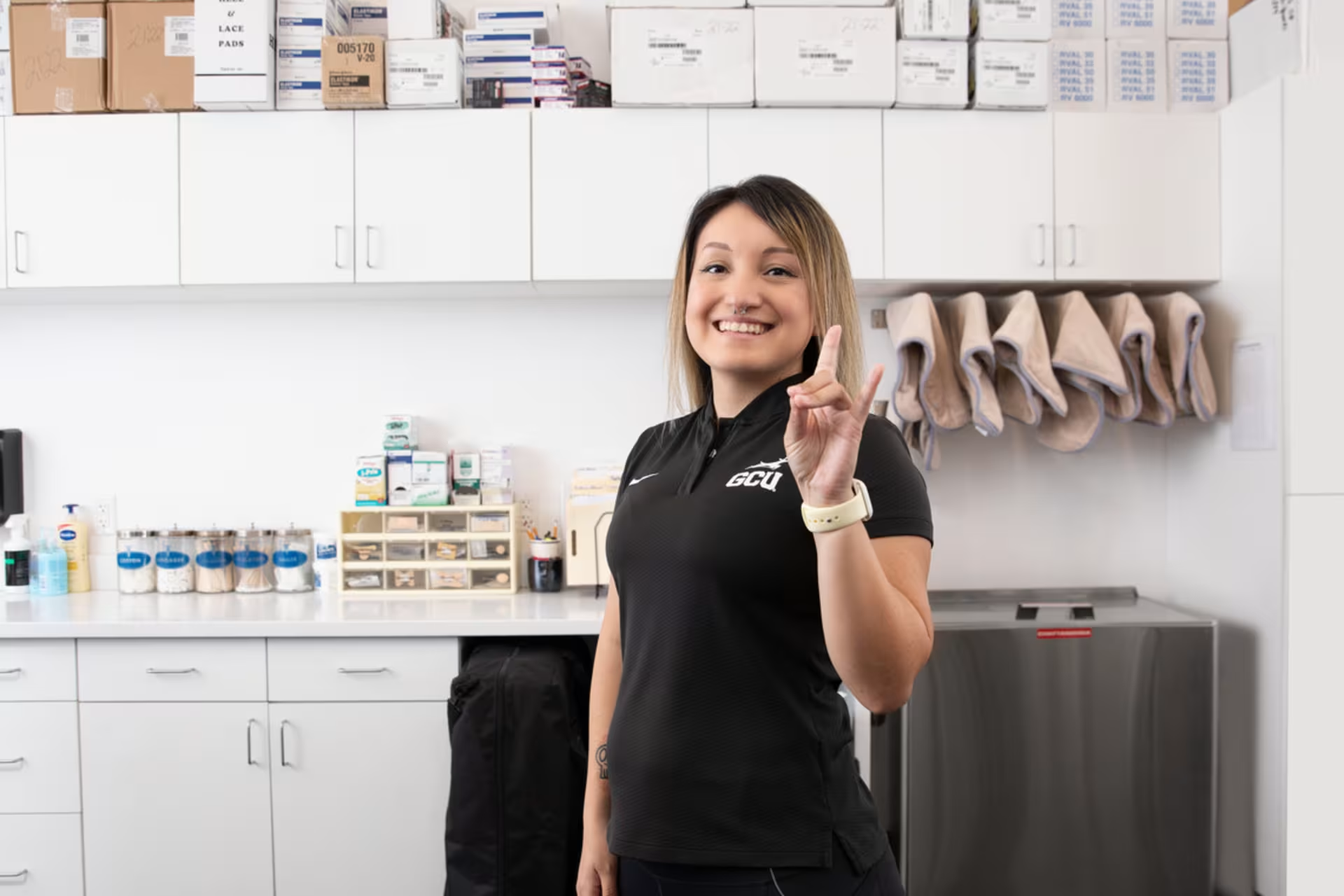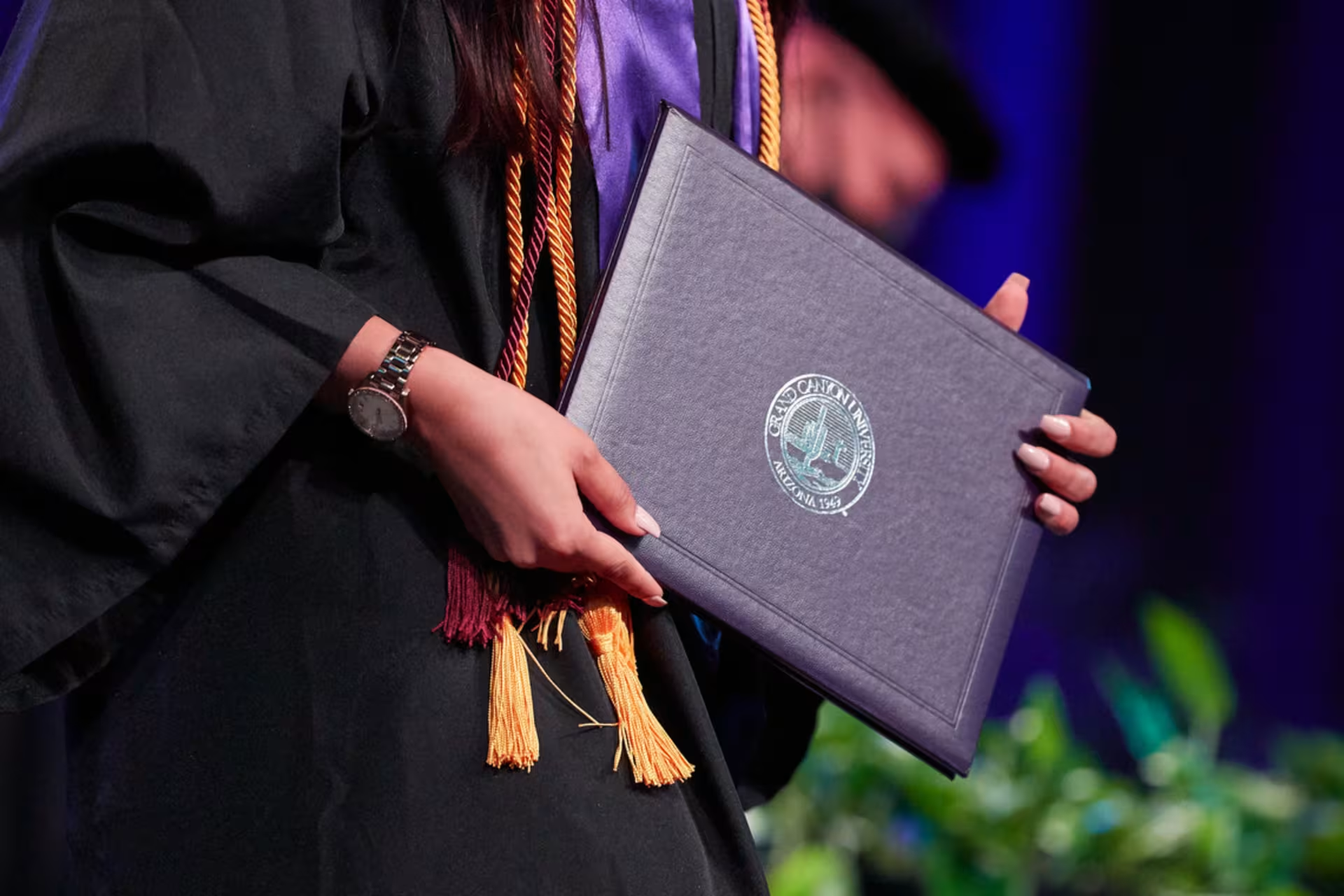
Bachelor of Science in Exercise Science: Pre-Athletic Training Emphasis
Develop Your Understanding of Human Movement and Wellness
The Bachelor of Science (BS) in Exercise Science with an Emphasis in Pre-Athletic Training at GCU can prepare you for graduate study in athletic training, sports medicine or exercise science. Offered by the College of Natural Sciences, this program teaches the foundational knowledge and skills necessary to promote health through physical movement. You’ll get a hands-on look at athletic training through a combination of theory-based courses and applied labs. This degree can put you on the right path toward pursuing a master’s in athletic training degree.
As an interdisciplinary field, exercise science focuses on human movement and exercise within the context of physiological and biomechanical factors. Make a positive impact on your community through wellness care.

Campus: $8,250 per semester [More Info]
Up to 90 credits, only 84 can be lower division
Credits: Fill out the Lopes Eval to find out what will transfer
Admission Requirements (Bachelor's)
- 16+ years old
- High School Graduate
- 3.0+ Unweighted GPA
OR 2.5+ Unweighted GPA and
- ACT: 19
- SAT: 1000*
Admission requirements may differ based on degree level, program and modality, or transfer status. Some programs of study may require a higher GPA and/or other qualifying criteria for admission. Please review full admission and program requirements in the University Policy Handbook.
*Math and reading only on a 1600 point scale (test date after 3/1/2016). SAT score of 1380 required for 2400 point scale (test date before 3/1/2016).
Shape Your Future in a Supportive Environment
At GCU, the journey matters as much as the end goal. When you join our Christian campus community, you’ll enjoy the fellowship of like-minded students who are preparing to use their talents to glorify God and serve His people. During your studies, you can benefit from an enriching campus culture, with plenty of clubs and activities to choose from, along with amenities including nearly 40 dining locations and housing options.
Explore specialized emphases designed to strengthen your knowledge of human movement, performance and rehabilitation, helping you prepare for careers in exercise science.

Pre-Athletic Training Emphasis Course Topics
BS in Exercise Science: Pre-Athletic Training emphasis curriculum provides a solid foundation in science and math competencies, while diving deeper into specific athletic training-related coursework and labs. You will examine relevant topics in nutrition, kinesiology, physical fitness, health promotion and athletic injury care in theory and in practice. Grasping these competencies involves studying advanced healthcare topics, applying existing studies to practical scenarios and deeply comprehending human anatomy and how movement affects overall health.
This program can prepare you to pursue graduate-level education, such as a master’s degree in athletic training, while supporting continued development of your skills and expertise. This undergraduate program aims to provide you with a strong starting point for further educational opportunities or entry-level roles in the field.
While completing your coursework, you will focus on competencies that can help you understand the breadth of the profession, including:
Analyzing functions of the human body and how adaptations of movement relate to overall health and wellness
Analyzing, interpreting and applying data to improve movement and enhance exercises
Performing appropriate preventative techniques
Considering psychological, biological and social factors and how they influence a person’s perception on healthcare practices
Understanding nutrition theory for illness prevention and weight control, with a look at food selection
Applying the principles and techniques of cardiovascular and strength training for different ability levels
Career Paths With a Pre-Athletic Training Focus
This degree can provide solid preparation to pursue career pathways, such as an exercise physiologist. Exercise physiologists analyze clients’ markers of health, including endurance and oxygen usage, and develop exercise and health promotion programs that help clients meet their physical fitness goals. As an exercise physiologist, your career would be devoted to helping people enjoy sports safely, manage chronic conditions and prevent health problems.(See disclaimer 1)
A master’s degree is required for those aspiring to become athletic trainers. GCU offers a Master of Science in Athletic Training that can help you prepare to pursue employment as an athletic trainer.
You may also explore a wide range of professional opportunities and find yourself employed in various settings, including but not limited to:(See disclaimer 2,3)
High schools
Colleges and universities
Hospitals
Corporate wellness
Rehabilitation clinics
Fitness facilities
Net worth of the fitness industry in the U.S. as of May 2024(See disclaimer 4)
Projected job growth rate for exercise physiologists from 2024 through 2034(See disclaimer 5)
Earn Your Degree in Exercise Science From an Accredited University
GCU is institutionally accredited by the Higher Learning Commission (HLC), an organization that provides a comprehensive review of education institutions. Pre-athletic training students can feel confident knowing that their curriculum meets quality standards established by the HLC.
Frequently Asked Questions
Use the following frequently asked questions and answers to get started on your career research in athletic training.
What is pre-athletic training?
What can you do with a BS in Exercise Science: Pre-Athletic Training Emphasis?
What do athletic trainers do?
Program Curriculum
General Education Requirements
Required General Education Courses
Core Courses

Take the next step by earning your Bachelor of Science in Exercise Science. Work toward making a positive impact on community health at GCU.
1. U.S. Bureau of Labor Statistics. (2025, Aug. 28). What Exercise Physiologists Do. Occupational Outlook Handbook. Retrieved November 2025.
2. U.S. Bureau of Labor Statistics. (2025, Aug. 28). Exercise Physiologists: Work Environment. Occupational Outlook Handbook. Retrieved November 2025.
3. ExploreHealthCareers.org. (n.d.). Exercise Physiologist. Retrieved November 2025.
4. Schmaltz, J. (2024, May 7). The Fitness Industry Is Worth $22.4 Billion to the U.S. Economy, Says New Report. Health & Fitness Association. Retrieved November 2025.
5. COVID-19 has adversely affected the global economy and data from 2020 to 2023 may be atypical compared to prior years. Accordingly, data shown is effective August 2025, which can be found here: U.S. Bureau of Labor Statistics, Occupational Outlook Handbook, Exercise Physiologists, retrieved November 2025.


